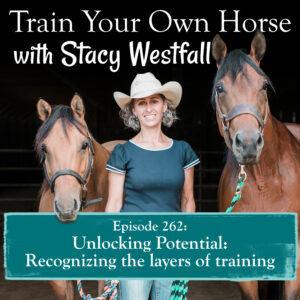Episode 262- Unlocking Potential: Recognizing the layers of training
November 22, 2023/

“…there are hundreds of exchanges that are happening between horse and rider, and being able to observe those in as much detail as you can really helps you unlock what’s happening with the communication.”
In this episode, two students join me, and we discuss the breakthroughs that are possible when the rider begins seeing the layers of training. The depth of learning lies in perceiving these layers and how they are impacting communication.
Topics include:
- Creating cycles of curiosity
- The value of being a better observer
- Seeing the horse as capable
- Seeing yourself as capable
- Physically getting stronger
- Repetition is more opportunities to say, yes, that is the answer, yes, yes!
By hearing from different perspectives, the concepts shared might land differently for you, and inspire you to recognize your horse’s and your own capabilities.
SUBSCRIBE TO THE PODCAST HERE:





YOURS FREE
WHY IS MY HORSE...?

